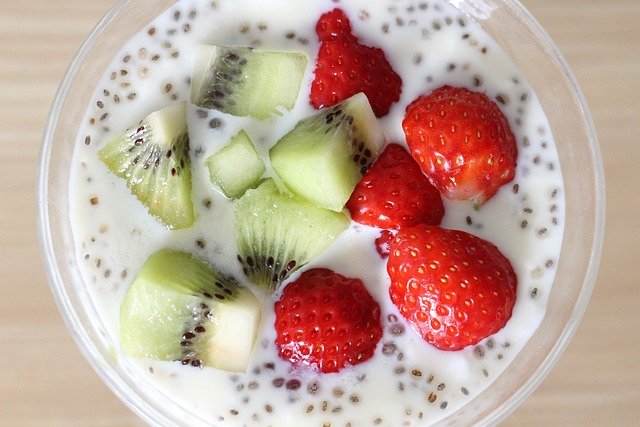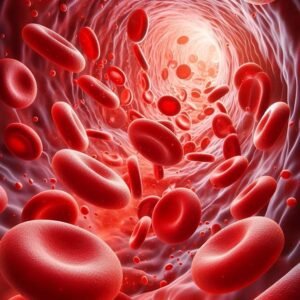
Nutritional Details (per 1 ounce or about 28 grams)
- Calories: Approximately 138
- Protein: 4.7 grams
- Fat: 8.6 grams
- Saturated Fat: 0.9 grams
- Monounsaturated Fat: 0.5 grams
- Polyunsaturated Fat: 6.5 grams (including omega-3 fatty acids)
- Carbohydrates: 12 grams
- Fiber: 10.6 grams
- Sugars: 0 grams
- Vitamins:
- Vitamin B1 (Thiamine): 0.2 mg (15% of the Daily Value)
- Vitamin B3 (Niacin): 1.2 mg (6% of the Daily Value)
- Minerals:
- Calcium: 177 mg (18% of the Daily Value)
- Iron: 2.2 mg (12% of the Daily Value)
- Magnesium: 95 mg (24% of the Daily Value)
- Phosphorus: 244 mg (24% of the Daily Value)
- Potassium: 44 mg (1% of the Daily Value)
Health Benefits
- High in Omega-3 Fatty Acids:
- Chia seeds are one of the richest plant sources of alpha-linolenic acid (ALA), a type of omega-3 fatty acid that supports heart health and can reduce inflammation. This is particularly beneficial for those following a vegetarian or vegan diet.
- Rich in Fiber:
- With over 10 grams of fiber per ounce, chia seeds are excellent for digestive health. Fiber aids in bowel regularity, prevents constipation, and helps maintain a healthy gut microbiome. It also contributes to feelings of fullness, making it easier to manage weight.
- Protein Source:
- Chia seeds provide a complete protein, meaning they contain all nine essential amino acids that the body cannot produce on its own. This makes them an excellent protein source for vegetarians and vegans.
- Bone Health:
- High in minerals such as calcium, magnesium, and phosphorus, chia seeds can contribute to bone strength and health. They contain more calcium per ounce than milk, making them a valuable addition to a bone-friendly diet.
- Antioxidant Properties:
- Chia seeds are rich in antioxidants, including quercetin and chlorogenic acid, which help protect the body from oxidative stress and may reduce the risk of chronic diseases, such as heart disease and cancer.
- Hydration Support:
- When soaked in liquid, chia seeds expand and form a gel-like consistency. This can help maintain hydration, making them a popular choice for athletes and those engaging in endurance sports.
- Weight Management:
- The high fiber content not only helps with digestive health but also promotes satiety, which can assist in reducing overall calorie intake and managing weight effectively.
- Heart Health:
- Regular consumption of chia seeds may lower blood pressure and cholesterol levels. The omega-3 fatty acids and fiber contribute to improved cardiovascular health by reducing inflammation and promoting healthy blood flow.
Serving Suggestions
- Smoothies: Blend chia seeds into smoothies for added nutrition and thickness.
- Pudding: Mix chia seeds with milk (dairy or plant-based) and sweetener to create a creamy pudding; let it sit until it thickens.
- Baking: Use chia seeds in baking recipes, such as muffins, bread, and energy bars, for added texture and nutrition.
- Toppings: Sprinkle chia seeds on yogurt, oatmeal, salads, or cereal for a nutritious crunch.
Considerations
- Hydration: It’s essential to drink enough fluids when consuming chia seeds, especially if eating them dry. They can absorb up to 10-12 times their weight in water, which can lead to digestive issues if not hydrated properly.
- Allergies: Chia seed allergies are rare, but those with known allergies to flaxseeds or sesame seeds may want to be cautious.
Conclusion
Chia seeds are a versatile and highly nutritious food that can enhance a balanced diet. Their unique properties and health benefits make them a great addition to meals and snacks, contributing to overall health and wellness.

- What are the health benefits of chia seeds?
- Chia seeds support heart health, aid digestion, promote weight loss, and provide a good source of omega-3 fatty acids.
- How many chia seeds should I eat a day?
- A typical serving is about 1 to 2 tablespoons (15-30 grams) per day.
- Are chia seeds a good source of protein?
- Yes, chia seeds are a complete protein source, containing all nine essential amino acids.
- Do chia seeds help with weight loss?
- Yes, their high fiber content helps you feel full longer, which can aid in weight management.
- Can you eat chia seeds raw?
- Yes, chia seeds can be eaten raw, but they should be hydrated in liquid to avoid digestive issues.
- What is the best way to consume chia seeds?
- Chia seeds can be added to smoothies, oatmeal, yogurt, or made into puddings.
- Are chia seeds gluten-free?
- Yes, chia seeds are naturally gluten-free, making them suitable for those with gluten sensitivities.
- How do you prepare chia seeds?
- Chia seeds can be soaked in water or milk for about 15-30 minutes to create a gel-like texture.
- Can chia seeds go bad?
- Chia seeds have a long shelf life, but they should be stored in a cool, dry place; check for an off smell to ensure freshness.
- Are chia seeds safe for children?
- Yes, chia seeds are generally safe for children and can be a healthy addition to their diet when introduced appropriately.







